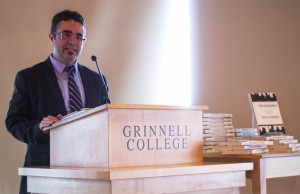
By Stephen Gruber-Miller
grubermi@grinnell.edu
Sociology Professor Davíd Cook-Martín unveiled his new book, The Scramble for Citizens: Dual Nationality and State Competition for Immigrants, at a reading on Tuesday.
This is the first book Cook-Martín has published. It originated as his dissertation project at the University of California, Los Angeles, before evolving into an interdisciplinary study of why people obtain dual citizenship and what it means to them.
Cook-Martín kept the presentation interesting and light-hearted as well as informative. He made a number of jokes, poking fun at his research method of walking around consulates and asking people about their search for citizenship. If the consulate didn’t realize he was doing research, he was sometimes asked to leave.
The book is unusual in that its methods are very interdisciplinary. It was primarily researched using the historical approach of archival research and the more traditional approach of ethnography.
“There is a tradition of historical comparative work in sociology. Max Weber and others were basically historical comparativists,” Cook-Martín said. “And so I think that I stand firmly in that tradition, but I also have been very comfortable using the methods developed by other disciplines so long as they help me answer the kinds of questions that I was after.”
Cook-Martín worked with quantitative data as well as qualitative records. He put together statistics on migrations of people from one country to another, but the numbers aren’t his main concern.
“You try as a sociologist to get the story behind the numbers,” he said.
The book used Argentina, Italy and Spain as its main cases of study. Cook-Martín mentioned at the reading that, due to nationalism and other historical conditions, it was much harder to obtain dual citizenship a hundred years ago. The numbers have greatly increased dramatically over the last century and he wants to understand why.
At the presentation on Tuesday, Cook-Martín read from a section of his book which told the story of Victoria, an Argentine woman who was trying to obtain a second citizenship in either Italy or Spain. His goal is to figure out what sort of motivations people like Victoria have for gaining dual citizenship.
“I often start with a story of someone that I encountered and work back from that to the historical circumstances that made that situation possible,” Cook-Martín said.
In many cases he found that people began the process of applying for dual nationality thinking of it simply as a type of insurance against outsourcing and economic uncertainty brought on by globalization. There usually wasn’t strong motivation to find their family roots or return to their ancestral homeland despite the fact that many had connections to the country to which they were applying for citizenship.
However, he noted that once they started finding old documents and learning the stories of their relatives, they often began to see the process as important to them personally because of their ancestry.
Through his research, Cook-Martín found the results of dual citizenship between countries causing unintended consequences. For instance, large numbers of Argentines with Italian citizenship vote in Italian elections without knowing anything about politics in Italy.
Besides examining what dual citizenship means to people, the other major research question that The Scramble for Citizens examines is the interconnectedness of immigration laws between countries. Cook-Martín found that there is intense competition between countries for skilled workers, which affects their immigration laws.
Cook-Martín has a second book coming out next year that will continue his research and concentrate more specifically on racial discrimination in immigration legislation across a wider variety of countries.

















































